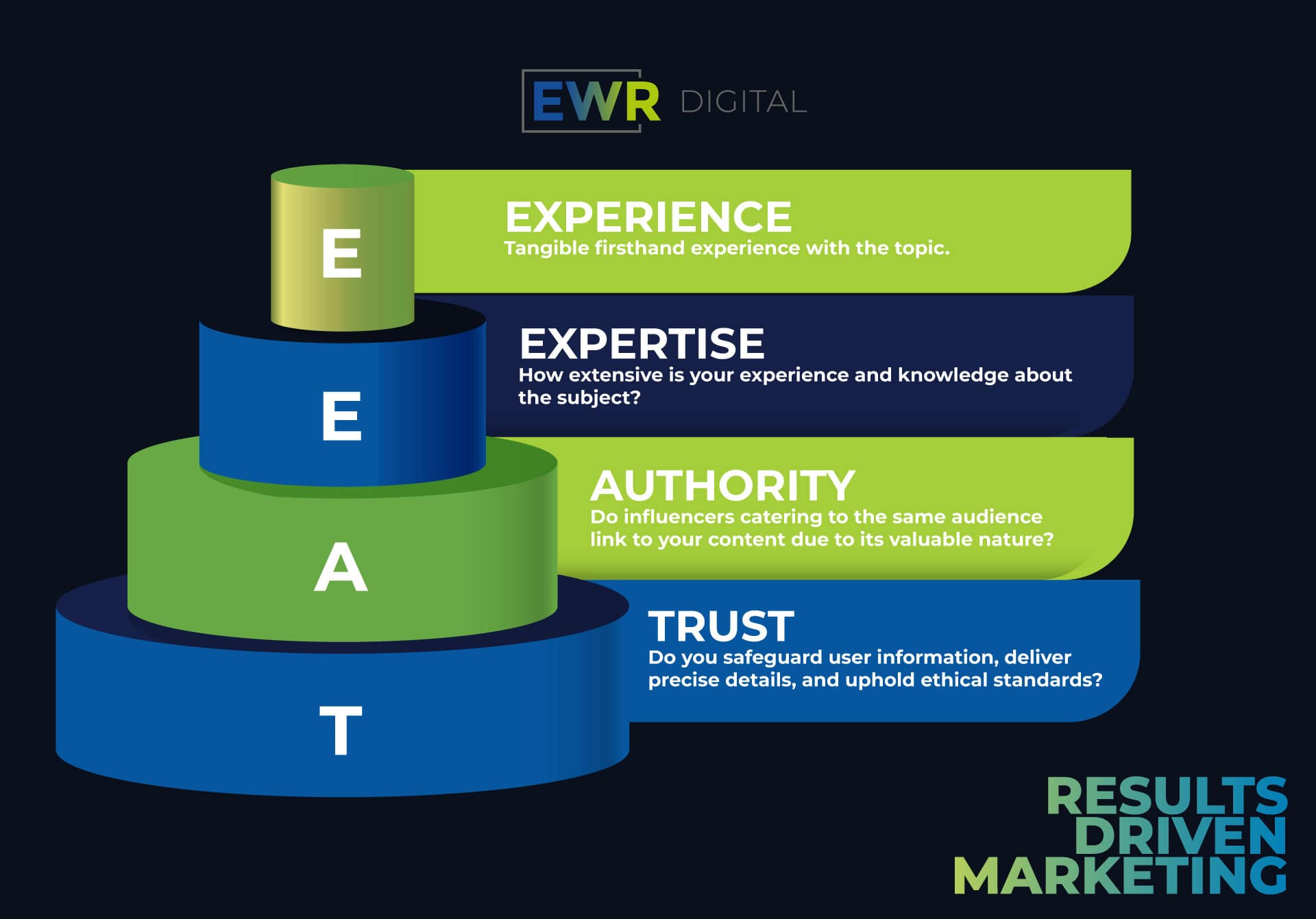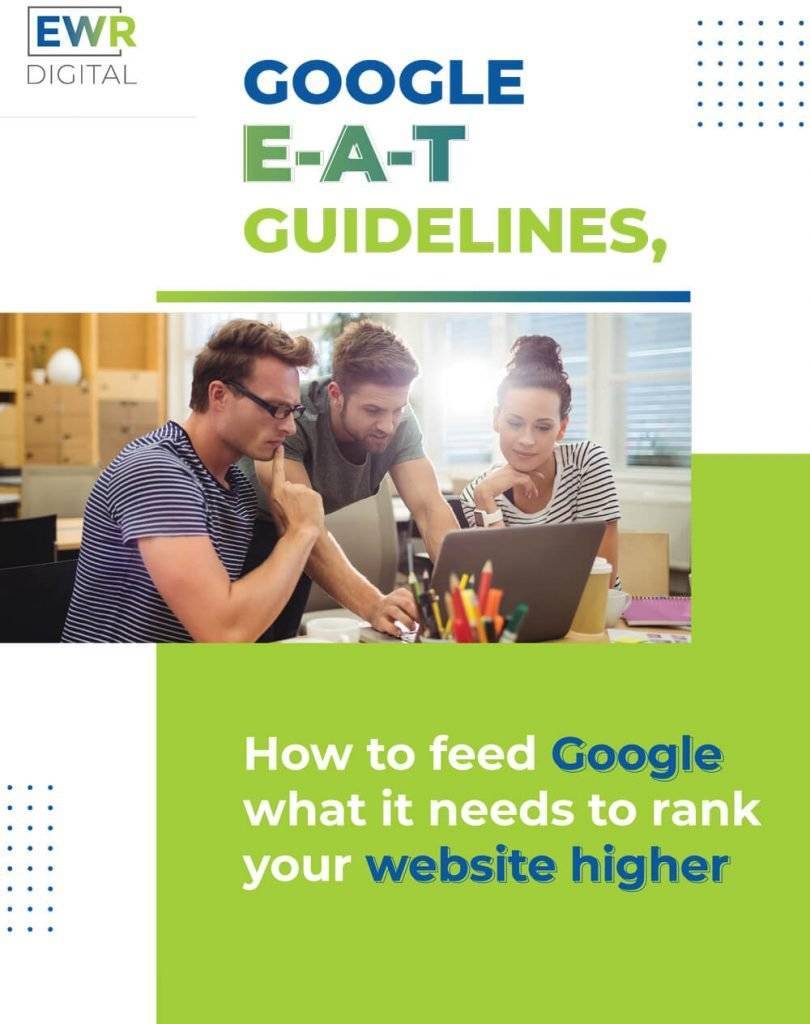
Google E-A-T: Part 1 – Expertise
Creating a website that brings in quality leads takes quite a bit of time and effort. You need to not only create high-quality content but also ensure that it’s following search engine optimization best practices and that you’re ticking off each of Google’s ranking factors as you go.
The latter can be quite difficult—Google’s algorithms always seem to be changing. The latest updates included a heavy focus on Google E-A-T, which threw marketers and content creators into quite the tailspin.
What is Google E-A-T?
Google E-A-T stands for Expertise, Authoritativeness, and Trustworthiness. It is a concept used by Google to evaluate the quality and credibility of webpages and websites in its search engine results. E-A-T is particularly important for websites that provide information on topics such as health, finance, and news.

For those in need of a quick update, Google E-A-T began trending heavily in 2018 thanks to Google’s Medic update, which continued emphasizing the importance of high-quality content that is relevant to searcher’s needs and inquiries.
While the Medic update brought serious attention to Google E-A-T, the reality of the matter was that E-A-T’s concept had been around since it was added to Google’s Search Quality Rater Guidelines back in 2014.
That means it had already been a regular part of Google’s ranking factors for some time, so why is it only just starting to send marketing teams and their content creators into a frenzy?
Many individuals who fall under YMYL (Your Money or Your Life) websites started seeing a decline in traffic due to the Google E-A-T page quality rating system. This system focuses on the page’s ability to showcase:
- Expertise: Ability to speak on a subject with the necessary expertise that consumers need to make an informed decision.
- Authoritativeness: Ability to speak with an authoritative voice, which requires properly showcasing your expertise in the given topic area.
- Trustworthiness: Ability to build trust between you and your audience through your authoritative voice by showcasing your expertise in the given topic area.
Suppose your content doesn’t showcase each of these aspects. In that case, chances are, Google’s page/website reviewers will mark your content as poor quality and irrelevant to searchers’ needs, resulting in lower page ranking, less organic traffic, etc.
Google E-A-T Part 1: Expertise
Having a basic understanding of Google E-A-T is an excellent start when approaching your content marketing strategy. However, it’s vital to take the time to educate yourself, in detail, on each aspect of Google’s page quality rating system, and when it comes to Google E-A-T, that means beginning with Expertise.
When creating high-quality content that your readers can trust, you need to make sure you are showcasing your expertise in your given topic, industry, or niche.
This isn’t the place for the insertion of opinions. Instead, you want to focus on factual information that is backed by relevant sources to prove that a reliable source backs each point you are making.
This is important because it shows your readers that you aren’t only speaking from personal expertise but that you’re able to do the necessary research to find authoritative, relevant resources to back up the information you’re presenting to readers.
When creating content that can showcase your expertise, you need to be able to showcase your ability to:
- Research reputable sources
- Insert the right kind of expertise into a piece
- Stay relevant to their audience and their needs
- Showcase who is creating the piece of content
How Does Research Factor into Your Google E-A-T Ranking?
According to Google’s Search Quality Rater Guidelines, it’s not enough to simply state facts without proper backlinking practices.
Backlinking is essential because it helps tell Google and its page ranking teams not only where you got your facts from but how much effort you put into your own research to build your own expertise on the given subject.
In their document, Google states that to boost your expertise, you need to be able to conduct research to back up your claims and determine just how reputable your sources are. One of the best ways to conduct reputation research on a source is to see what other authoritative sources have to say about them.
Of course, you can always use domain authority to help you out as well, as these sources have been vetted by Google’s crawl bots already and have been deemed reliable, authoritative websites.
What Does “Kind of Expertise” Mean?
When going through Google’s Search Quality Rater Guidelines, you’ll notice that they refer to “type” or “kind” of expertise.
This is vital to note because not all expertise is regarded as the same. That simply means that the level of expertise that is required between one industry/niche can be completely different from another.
For example, a DIY website’s expertise may be determined by the experience of those advising readers on how to do something. In contrast, the expertise of a person writing about the flu requires some sort of medical background.

Not sure if you are writing the right kinds of expertise content? (Our is SEO.) Then ask yourself how you can put your expertise on display.
Take the example from above: if you’re a master DIY blogger, you could establish your expertise in the area by talking about your previous experience and how you gained your knowledge in your “About Me” page and include an online portfolio of completed projects. Of course, you can also link other credible sources, such as This Old House (if your DIY projects include DIY home projects), to help you back up any claims you make.
However, suppose you are writing about medical topics as an upcoming chiropractor. You’ll want to talk about your education and achievements somewhere on your website and utilize other scientific resources to help you back up any claims you make in your content. In this case, relevant sources could include links/references to studies from the National Center for Biotechnology Information (NCBI).
How Does Information Relevancy Play into your Google E-A-T Ranking?
Believe it or not, relevancy plays a factor in each step of Google’s E-A-T ranking. One of the primary goals of this update is to prioritize content relevant to those searching for it. When it comes to establishing your content expertise, you need to make sure you are sticking to what you know.
For instance, if you are trying to establish yourself as a nutritional expert, you can’t be focusing your attention on the impacts that the Flu can have on the body and how to self-diagnose your symptoms.
Why? Because that’s not in your wheelhouse as far as expertise goes. Sure, eating right can help you stay healthy; however, you don’t necessarily have the expertise to be giving that kind of medical advice. Therefore, according to Google E-A-T, your content is no longer relevant to your audience.
Now, that’s not to say you can’t include some overlapping information. That just means you’ll need to be citing reliable sources to help you back up your claims. However, this information should just be supplemental, not the focus of your pieces.
Make Sure All Your Content is Attributed to Someone
If you’re trying to establish your website as relevant to your audience, you need to make sure you are properly attributing your content to someone. Sure, while some people attribute their content to the brand, that doesn’t really give your audience someone to relate to.
While some larger name-brands have built their authority enough to publish under their brand name, most brands would benefit much more from content that is attributed to an actual person.
This puts a face to the brand, making your content not only relevant but relatable—two factors that are heavily considered when it comes to Google E-A-T and ranking content on the search engine.
Creating Expertise Content for Your Website in 4 Steps
Whether you’re a new brand trying to rank new content on Google or you’re revisiting your content marketing strategy to boost your current rankings and bring in better, higher-quality traffic, you’ll want to make sure you are taking the time to create content that showcases your expertise in your given industry or niche.
Not quite sure how to get started? Here are four steps to help you start creating content that enables you to establish your expertise to both your readers and those checking your content against the Google E-A-T guidelines:
1. Research Your Industry/Topic Thoroughly
As with any content marketing strategy, the first thing you’ll want to be doing is conducting thorough research. If you’re newer to content creation, or if it’s been some time since you last took a look at your industry trends and news, then you’ll want to make sure you are taking adequate time to do thorough market research.
This information will help you identify trends in your industry and generate topics according to your target audience’s current needs.
Once you’ve started to identify new/trending topics both in your industry and amongst your audience, you can condense your research to help you build a strong content calendar. With topics at the ready, you can finally focus your attention on conducting relevant keyword research to help you with your optimization process later down the line.

This research phase will also prove beneficial for external linking during the creation process, which will help establish your expertise in proving facts with relevant research.
2. Write with Confidence
When it comes time to write, if you are writing within your wheelhouse, you’ll write with confidence and showcase your expertise with ease. Readers can easily pick up on the level of confidence writers have through their choice of words, the tone they use, etc.
That’s why it’s essential to take your time and pour your expertise into every piece. Utilize the proper terminology that your consumers will understand and make your claims with confidence. Don’t forget that you can (and should) be backing up each claim with relevant research to help further prove your point and show your readers you know what you are talking about.
3. Optimize Your Content Properly
While you may be focusing your attention on Google’s E-A-T recommendations, you can’t forget to optimize your content per SEO best practices. While the focus of Google E-A-T is to create authoritative, trustworthy content to establish your brand as an expert within the industry, that’s only one factor that needs to be considered during the content creation process.
If you’re not taking the time to properly optimize your content with relevant keywords, then there is very little for Google to use to understand what your content is about.
Remember: Google’s crawl bots don’t sit and read your content as your audience does. Their bots simply scan for the most relevant pieces of information. Suppose you haven’t taken the time to define that information by labeling focused/targeted keywords.
In that case, the bots won’t identify it as a piece of relevant content, which can significantly harm your overall efforts to optimize your content for expertise, authority, and trustworthiness.
4. Attribute Your Content to the Appropriate Author
Once your piece of content has been created and properly optimized, then you’re ready to hit publish!
…Or are you?
Remember that to establish yourself as an expert, you need to be attributing your content to yourself. The same rule applies when you have guests posting on your blog to increase your brand’s authority. Attributing guest blogs to authoritative figures in the industry will go a long way in building your authority and expertise.
Sure, you can attribute your posts to your brand as a whole—but that won’t help if you try to encourage your audience to relate to you as a creator or authoritative figure. This is especially true for smaller blogs/websites. Give your readers someone to relate to by attributing your blogs to a specific person and providing readers a quick author bio to help them get to know who is speaking to them.
Start Showcasing Your Brand’s Expertise Today
If you’re focusing your attention on Google E-A-T and need some help with either optimizing your website and its content or help to improve your branding and website design, then let the team at EWR Digital help!
Curious how EWR Digital can help you? Then contact us today for more information.
